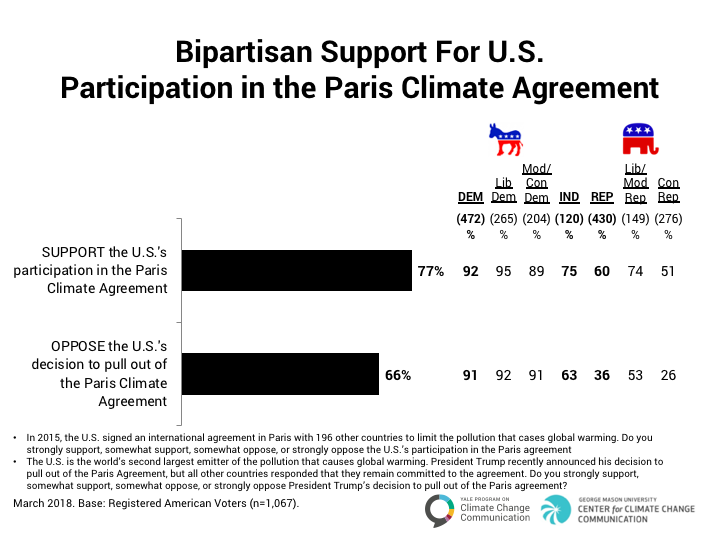Report · May 8, 2018
Politics & Global Warming, March 2018
By Anthony Leiserowitz, Edward Maibach, Connie Roser-Renouf, Seth Rosenthal, Matthew Cutler and John Kotcher
Filed under: Policy & Politics
2. Should the United States Act on Global Warming?
2.1. Most registered voters say the United States should reduce greenhouse gas emissions, regardless of what other countries do.
Most registered voters think the United States should reduce its greenhouse gas emissions, regardless of what other countries do (70%). Majorities of liberal Democrats (91%), moderate/conservative Democrats (77%), and liberal/moderate Republicans (63%) take this position, as do 46% of conservative Republicans.
Only 4% of registered voters (including no Democrats, but 5% of Independents and 8% of Republicans) say the United States should not reduce its emissions (see Data Tables).
2.2. Bipartisan support for U.S. participation in the Paris Climate Agreement.
In December 2015, officials from 197 countries (nearly every country in the world) met in Paris at the United Nations Climate Change Conference and negotiated a global agreement to limit global warming. On Earth Day, April 2016, the United States and 174 other countries signed the agreement, with all of the other countries following suit since then. On June 1 2017, President Trump announced that the United States will withdraw from the agreement.
In direct contrast to President Trump’s decision, more than three in four registered voters (77%) support U.S. participation in the Paris Climate Agreement. Support ranges across most of the political spectrum, including a large majority of Democrats (92%, including 95% of liberal Democrats), three in four Independents (75%), and a majority of Republicans (60%, including 51% of conservative Republicans, an increase of eight percentage points since October 2017, see Data Tables).
Similarly, two in three registered voters (66%) oppose President Trump’s decision to pull out of the Paris Climate Agreement, including 91% of Democrats and 63% of Independents, but only 36% of Republicans.

